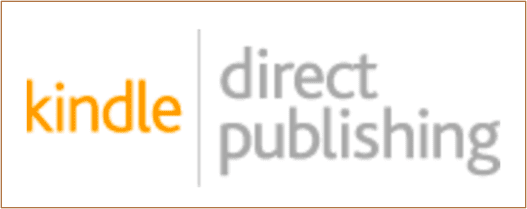
In 2007 Amazon launched a new branch to their business called Kindle Direct Publishing (KDP), a self-publication platform. Via this service, users can “self-publish eBooks and paperbacks for free,” sell to a global market, and even earn royalties of up to 80% (Kindle Direct Publishing; “Take Control with Self-Publishing”). According to Amazon, it takes less than five minutes to publish a work and it will appear worldwide on the Kindle Store within two days (“Take Control with Self-Publishing”). All one needs to do is write, upload, and sell – all while maintaining full rights to the work (Kindle Direct Publishing).
Given the ease with which anyone can self-publish using KDP, Amazon has received praise for streamlining the publication process and democratizing the ability for newer and lesser-known authors to publish their work. Moreover, choosing self-publication over traditional publication contracts with external companies comes with a number of benefits. These include having complete creative control, higher royalty rates and more frequent pay days, greater opportunities for niche projects, a faster publishing process, and little to no gatekeeping, deadline, or rejection stress (Kieffer, 2017). As a result, many writers are now turning to KDP for self-publication.
One author who has found success using this platform is Mike Omer, who has sold more than 10,000 books through Amazon and reached the top spot on the Author Rank system above high-profile names like J. K. Rowling and Stephen King during the 2018 Prime Day sale (Semuels, 2018). He was even able to quit his job as a computer engineer in order to pursue his dream of being a full-time writer (Semuels, 2018). Omer told The Atlantic that these accomplishments were only possible because of KDP, since the service “can expose me to millions, or tens of millions of readers” (Semuels, 2018). Indeed, without Amazon’s KDP, authors like Omer are likely to struggle in a highly competitive and constantly fluctuating traditional publication market.
Despite the advantages KDP gives to many hopeful authors, the ability for anyone to self-publish has also sparked controversy as the platform has become a haven for material that most publication companies refuse to print (Ava & Tseng, 2020). For example, since 2014 Billy Roper ––the leader of ShieldWall, a group that wants to build a white ethnostate within the United States–– has published 18 novels via Amazon, specifically in the hopes of growing his organization (Anti-Defamation League and Ava; Tseng, 2020). In an interview with ProPublica, Roper said KDP was an ideal platform to publish his work because “People can go to Amazon—which is mainstream and acceptable, there’s nothing radical about that— order a book, and in the privacy of their own home they can read the book without ever having to visit a white-nationalist website” (Ava & Tseng, 2020). In their content guidelines, Amazon states that:
As a bookseller, we believe that providing access to the written word is important. That includes books that some may find objectionable, though we have policies governing which books can be listed for sale. We invest significant time and resources to ensure our guidelines are followed, and remove products that do not adhere to our guidelines. We also promptly investigate any book when a concern is raised. (“Content Guidelines for Books”)
Despite KDP’s promise not to sell content that promotes hate speech or advocates terrorism, some of Roper’s works remain available for purchase on Amazon (“Content Guidelines for Books”).
Public figures can also be drawn into the ambiguous realm of anonymous self-published works. A book falsely claiming authorship by Kyle Rittenhouse –a 17-year-old who fatally shot two protesters with an AR-15 style rife in August 2020– has recently become available for purchase on Amazon. Despite the brevity of the 20-page long work, it encourages “true patriots” with “holy rage” to obtain semi-automatic weapons and “join a militia to learn combat skills” (Croucher, 2022). While it is impossible to know how many copies have actually sold, since the book only has one (five-star) review it is likely that the book is not especially popular. Though Rittenhouse’s spokesman has explicitly stated that Rittenhouse did not write the book, it remains available on the platform and was even ranked at 200 in Amazon’s “30-Minute Politics & Social Sciences Short Reads” (Croucher, 2022). It is unclear how many of the book’s purchases will know that Rittenhouse did not actually write or endorse this book bearing his name.
Due to the presence of such material on Amazon, some argue that KDP needs to do a more thorough job of reviewing the material that will be sold on their platform and perform background checks on the authors submitting for publication. However, others say that self-published white supremacist or hateful literature is a fringe phenomenon that receives little engagement anyway, and more honest authors would suffer if a rigorous review process was implemented. Not only would the release of books be significantly delayed, but books that do not contain offensive content may be swept up with those that do if a private company is left alone to decide what is and is not considered “offensive.” Though white supremacist fiction may be removed from the site, so too might content like union-organizing guides.
Once viewed as a less-reputable way to make one’s work available to the public, the choice to self-publish has become more acceptable in the writing world – particularly thanks to platforms like Amazon’s KDP. While some view it as a great tool for newer and lesser-known authors to break through publishing hurdles with external companies, others see it as a liability that allows the mainstream promotion of dangerous ideologies. Because self-publishing is likely to become more popular in the coming years, it is important for us to carefully consider whether avenues like KDP are more helpful or harmful to democratic society.
Discussion Questions:
- What are the ethical tensions present in the ability for anyone to self-publish?
- Who is responsible for the spread of unethical reading material? The author, the distributor, the consumer, someone else, or a combination of these?
- Are the issues discussed in this case specific to Amazon’s KDP, or would any self-publication platform be subjected to the same problems?
- If Amazon were to implement a more rigorous review process, what guidelines would you suggest they follow? What ethical tensions would arise from these guidelines?
- How free should the creation and sharing of information be in the ideal democracy?
Further Information:
Anti-Defamation League. “Shield Wall Network (SWN).” Anti-Defamation League. Available at: www.adl.org/resources/backgrounders/shield-wall-network-swn
“Content Guidelines for Books.” Amazon. Available at: https://www.amazon.com/gp/seller-account/mm-summary-page.html?ld=AZFooterSelfPublish&topic=200260520& ref_=footer_publishing
Croucher, Shane. (2022, January 4). “Amazon Sells Fake Kyle Rittenhouse Book Encouraging Violence Against ‘Woke Mob.’” Newsweek. Available at: https://www.newsweek.com/amazon-fake-kyle-rittenhouse-book-violence-against-woke-mob-1665313
Kieffer, Kristen. (2017, July 3). “The Pros and Cons of Self-Publishing Your Fiction.” Well-Storied. Available at: https://www.well-storied.com/blog/the-pros-and-cons-of-self-publishing
Kindle Direct Publishing. “What is KDP?” Amazon. Available at: https://kdp.amazon.com/en_US/help/topic/GHKDSCW2KQ3K4UU4
Kofman, Ava and Francis Tseng. (2020, April 7). “The Hate Store: Amazon’s Self-Publishing Arm Is a Haven for White Supremacists.” ProPublica. Available at: www.propublica.org/article/the-hate-store-amazons-self-publishing-arm-is-a-haven-for-white-supremacists?utm_medium=social&utm_source=facebook&fbclid=IwAR16_GiWcYeYDN_zjKdhaUNwnYbFeN_apVO72YnHab6XSL9vrqLmjaI_ixE
Semuels, Alana. (2018, August 7). “The Authors Who Love Amazon.” The Atlantic. Available at: www.theatlantic.com/technology/archive/2018/07/amazon-kindle-unlimited-self-publishing/565664/
“Take Control with Self-Publishing.” Amazon. Available at: https://www.amazon.com/gp/seller-account/mm-summary-page.html?ld=AZFooterSelfPublish&topic=200260520& ref_=footer_publishing
Authors:
Madi Thomason, Kat Williams, & Scott R. Stroud, Ph.D.
Media Ethics Initiative
Center for Media Engagement
University of Texas at Austin
January 13, 2022
Image: Screen capture from Amazon.com
This case was supported by funding from the John S. and James L. Knight Foundation. These cases can be used in unmodified PDF form in classroom or educational settings. For use in publications such as textbooks, readers, and other works, please contact the Center for Media Engagement.
Ethics Case Study © 2022 by Center for Media Engagement is licensed under CC BY-NC-SA 4.0




